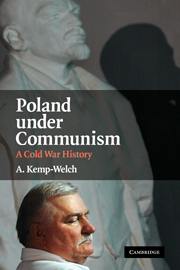8 - Détente
Published online by Cambridge University Press: 06 January 2010
Summary
The crushing of the Prague Spring was a turning-point in the conduct of the Cold War. For the first time, the Soviet Union, ‘in collusion with other powers, acted as a deliberate aggressor without even the pretence of legality behind it’. Unlike the Hungarians in 1956, the Czechs and Slovaks had remained loyal to the Warsaw Pact. A joint document, signed in Bratislava on 4 August, affirmed the sovereignty of Czechoslovakia and the inviolability of its borders. Since this had been torn up less than three weeks later, the question arose whether the Soviet government could be trusted in international relations again.
The invasion had two further consequences. Whilst spillover in Moscow was short-lived – a small demonstration in Red Square and student murmurings – citizens in other Union Republics became more engaged. The Politburo complained (11 September) that ‘events in Czechoslovakia are still giving rise to illegal nationalist activities’ in Ukraine. Nationalists were ‘disseminating vile sentiments and malicious fabrications’ intended to stir up bourgeois notions of an ‘independent Ukraine’. Secondly, the impact on Sino-Soviet relations was severe. The 1968 invasion, and the border clashes which began on the Ussuri River in March 1969, were reasons given by the Chinese Premier for naming the Soviet Union as China's ‘main enemy’. Faced with Soviet expansionism, China would seek a common front with the USA.
NATO was initially alarmed that Moscow might move elsewhere in Europe. The most likely target was thought to be Romania.
- Type
- Chapter
- Information
- Poland under CommunismA Cold War History, pp. 172 - 202Publisher: Cambridge University PressPrint publication year: 2008



